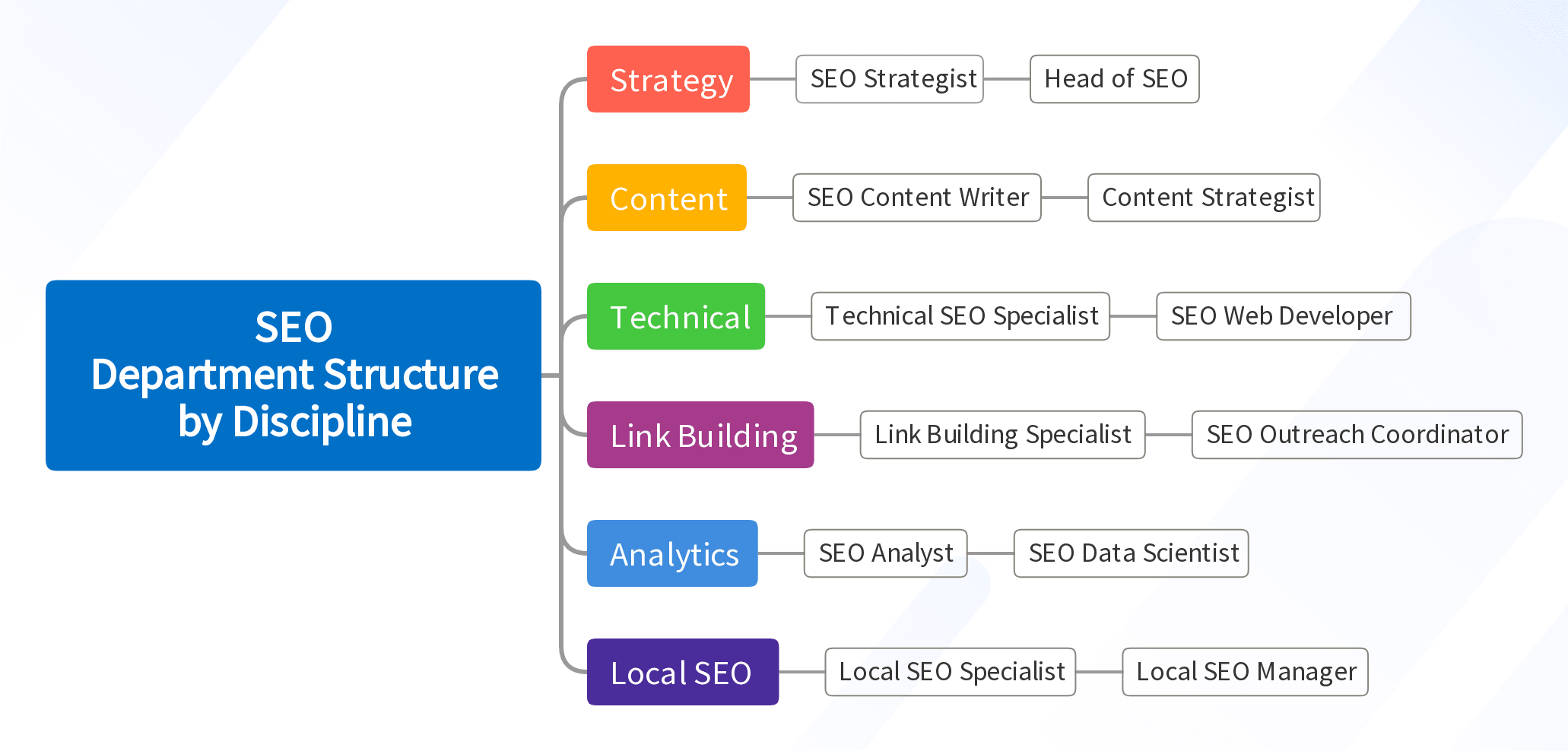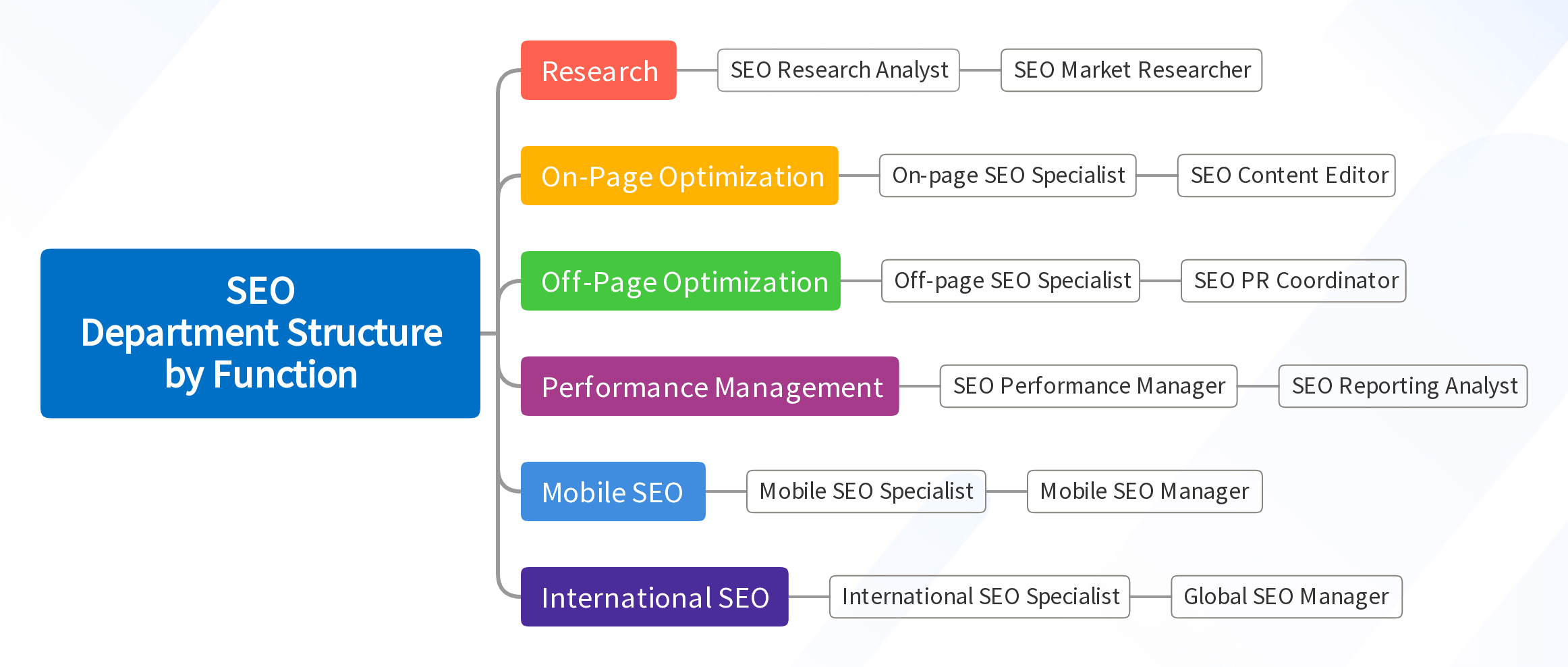

SEO teams stand as pivotal players in the vibrant world of business. Their expertise shapes a company's online visibility.
Crafting an effective SEO team requires strategic planning. This ensures a brand's voice echoes strongly across the digital landscape. We've learned this firsthand while growing our own marketing agency, GrantSpark.
But first, let's talk about the SEO department structures you have to choose from.
Best for Growth Marketers
Best for Paid Ads & CMO's
Table of Contents
Structuring SEO Department
There are two main types of department structures based on company size and resources.
- SEO department structure by discipline
- Org Type: Traditional corporate departments
- Best For: Midsize/Enterprise companies
- SEO department structure by function
- Org Type: Employees are grouped by activities and objectives
- Best For: Small to Medium Sized Business (SMB)
Let’s go in-depth to each one of them.
1. SEO Department Structure by Discipline


Discipline-based structure involves building teams centered around various marketing disciplines. For example, SEO, Content, Market Research, and Product Strategy could each form separate teams within a department.
| Discipline | Key Skills | Potential Roles |
|---|---|---|
| Strategy | SEO knowledge, Strategic planning, Analytical thinking, Market research, Problem-solving | SEO Strategist, Head of SEO |
| Content | Content creation, Keyword research, Copywriting, User experience, Creativity | SEO Content Writer, Content Strategist |
| Technical | HTML/CSS, JavaScript, SEO tools, Website optimization, Site architecture | Technical SEO Specialist, SEO Web Developer |
| Link Building | Outreach skills, Relationship building, Content marketing, Social media, SEO tools | Link Building Specialist, SEO Outreach Coordinator |
| Analytics | Data analysis, SEO tools, Google Analytics, Reporting, Critical thinking | SEO Analyst, SEO Data Scientist |
| Local SEO | Local search optimization, Google My Business, Citation building, Review management, Geotargeting | Local SEO Specialist, Local SEO Manager |
2. SEO Department Structure by Function


Another approach is structuring by function, where teams are formed based on the different functions they perform. For example, promotion, launches, and relationship management could all be separate teams.
| Function | Key Skills | Potential Roles |
|---|---|---|
| Research | Trend Analysis, Keyword Research, Competitive Analysis, Data Mining, Market Research | SEO Research Analyst, SEO Market Researcher |
| On-Page Optimization | Meta Tagging, HTML/CSS, Keyword Optimization, User Experience, Content Structuring | On-page SEO Specialist, SEO Content Editor |
| Off-Page Optimization | Backlinking, Influencer Outreach, Social Media Marketing, Guest Posting, PR | Off-page SEO Specialist, SEO PR Coordinator |
| Performance Management | SEO Tools, Reporting, Google Analytics, Performance Tracking, Data Analysis | SEO Performance Manager, SEO Reporting Analyst |
| Mobile SEO | Mobile Optimization, User Experience, Page Speed Optimization, AMP, Responsive Design | Mobile SEO Specialist, Mobile SEO Manager |
| International SEO | Localization, Multilingual SEO, Geo-targeting, Cultural Understanding, International Regulations Compliance | International SEO Specialist, Global SEO Manager |
SEO Team Size versus Business Scale
To achieve successful marketing outcomes, you need to align the team size with your business's scale – a strategic approach that helps optimize resources and drive targeted growth.
| Business Scale | Ideal Department Size | Explanation |
|---|---|---|
| Start-up | 1-2 | Limited resources, less complexity, fewer web pages. |
| Small-Medium Business | 3-5 | Increased content and keyword management, more online presence. |
| Large Enterprise | 6+ | Greater content volume, diverse keyword strategies, multiple domains. |
Factors to Consider When Deciding On an SEO Department Structure
- Business Objectives: Understand your company's goals. The structure of your SEO team should align with these objectives, ensuring that every strategy is directed towards achieving them.
- Resources Available: Take stock of the resources you have. This includes both your budget and human resources. A small business might need a lean SEO team, while a larger one may need more personnel.
- Skills Required: Identify the skills your SEO team will need. This could range from content creation, keyword research, to technical SEO knowledge. Ensure your team has a diverse set of skills to cover all aspects of SEO.
- Industry Dynamics: Each industry has unique SEO requirements. By understanding these, you can structure your team to better address industry-specific SEO challenges.
- Adaptability: In the dynamic world of SEO, adaptability is key. Your team structure should be flexible, allowing you to adjust as new SEO trends and techniques emerge.
Explore other marketing departments:
- Brand Management Team Structure
- Digital Marketing Agency Team Structure
- Growth Marketing Team Structure
So, there you have it, a detailed overview of an SEO team structure. From the essence of the team and key roles, to structuring and optimizing; every aspect tailored to achieve success on your business blueprint.
Next, check out our list of the best freelance websites to find SEO experts.




















